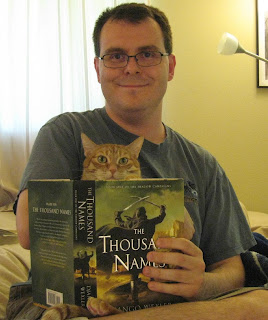
Let’s take a step back to December 2011 or so. I was feeling pretty good at the time. After endless writing and re-writing, and even more endless waiting for queries to come back, I had an agent who was enthusiastic about
The Thousand Names and thought we had a good chance of selling. Not a book deal, yet, but definitely progress. After doing an edit based on his advice, I thought we were pretty close to a submission. The last thing he needed, he told me, was a synopsis of the rest of the titles in the series.
Oh, I thought.
Hrm.
The Thousand Names was always intended to be the beginning of a series. Like many fantasy readers, I cut my teeth on these epic sagas, and I could think of nothing more exciting than to start constructing something grand. (I think of this genre as “doorstop fantasy,” where it’s not a
real book unless you could use it to deflect small-arms fire.) But the actual writing of the book had occupied most of my time, so I had only the vaguest mental sketch of what the series would look like. It would be a trilogy, because everyone seems to like trilogies, and I knew more or less where I wanted it to end and a couple of cool things that would happen along the way. But that was about it.
Writing these synopses, therefore, was not a trivial undertaking, because it meant, essentially, deciding on the plot for all the rest of the books. But having come so far, I couldn't exactly turn back, so over my Christmas vacation I plunged into them as best I could.
Doing the outline for a book—a practice I used to hate, but I have since come around to—is a strange process. In some ways it feels harder than actually writing the book. A lot of the heavy lifting in writing (for me, anyway) is
making decisions about where things should go, and worrying about whether those decisions fit together neatly. When you’re making these decisions as they come up in the plot (I tend to write novels straight through, from beginning to end) you've got some time between important choices, and when you make one you can follow it along for a while before you have to start thinking hard again.

When outlining, on the other hand, you do nothing
but make important decisions, because that’s all the outline is—a skeleton, built out of all the biggest choices you've made, with all the bits that might be easier to write left out. You don’t have to worry about sentence-level writing, which can be a relief, but what you’re left with is an experience that can best be described as “intense.” For me it feels like compressing weeks of writing into days; it’s exhausting.
But—and this is the key—it’s
hugely helpful. I figured out more thing about
The Shadow Campaigns during those few weeks than I had in the previous
five years, simply because I had no choice but to sit down and write them out. It changed massively from my original vague conception, even the parts where I thought I knew what I wanted. It also became
five books instead of three, because as I wrote out the plot it was clear it simply wouldn't all fit into a trilogy.
And, one I had the series plot in place, it helped me improve
The Thousand Names as well. Some of it was world-building—in order to get the series plot to work, I had to work out a much more detailed map and chronology, which helps add some richness to the background. Some of it, though, involved changes to the plot and characters in order to set up future events for a better payoff, or to plant those little seeds that people will (hopefully) remember when I come back to them two books later.
The result, I think, is a book that both stands on its own merits and serves as a foundation for the next step. Book Two is still in editing, but I’m already eager to get it finished; both so I can show everybody what happens next, so I can start work on Book Three…

Check out the rest of
Django Wexler’s blog tour for the inside scoop on
The Thousand Names, Book One of
The Shadow Campaigns:
•
Recruitment: Introducing the cast of The Thousand Names, featuring excerpts! over at
I Smell Sheep•
Training: Using History to Build a Fantasy Society over at
SF Signal•
Deployment: We've Come a Long Way over at
The Qwillery•
Reconnaissance: Point of View as a Precious Resource over at
Anne Lyle's blog•
March!: Maintaining Forward Momentum, Or, Things Should Happen In Books over at
The Book Smugglers•
The Day of Battle: Writing Battle Scenes over at
Suvudu•
The Pursuit: Planning a Series over at Fantasy Book Critic
•
The Butcher's Bill: Kill Your Darlings, featuring an exclusive excerpt! over at
SciFiChick

Author Information: Django Wexler graduated from Carnegie Mellon University in Pittsburgh with degrees in creative writing and computer science, and worked for the university in artificial intelligence research. Eventually he migrated to Microsoft in Seattle, where he now lives with two cats and a teetering mountain of books. When not planning Shadow Campaigns, he wrangles computers, paints tiny soldiers, and plays games of all sorts.
NOTE: Author picture courtesy of
M.L. Brennan. All other pictures courtesy of the author.







